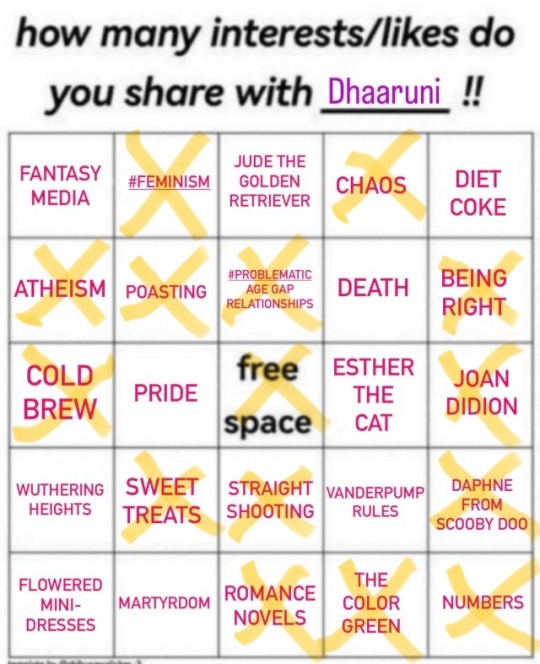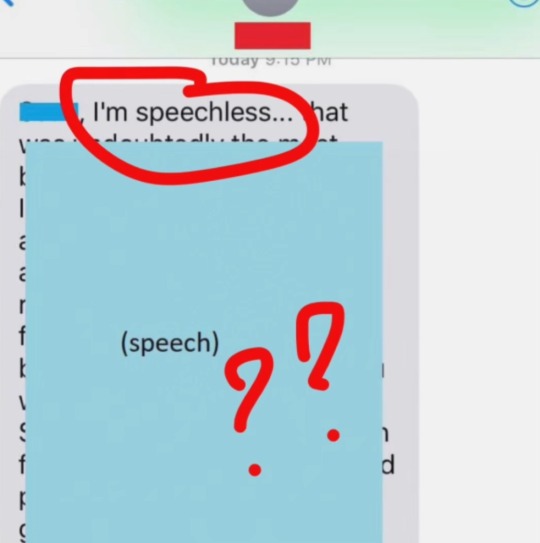Text
Love vintage aesthetics but unfortunately there’s nothing worse than an m/f couple* that’s really into vintage stuff
*bisexuals in m/f relationships you are expressly included in this category I’m sorry to say I wish I didn’t have to do it but it’s true.
32 notes
·
View notes
Text
Guys I apparently have two flower subscriptions this spring (I only remember getting one)
3 notes
·
View notes
Text
I was telling my boyfriend how today was a hungry day for me where I just want to eat all day and he had no concept of what I was talking about
8 notes
·
View notes
Text
Full disclosure, I slept with my childhood teddy until i lost her in August 2022 (which i am still not over), and now that Lionel is gone, i can sleep with my childhood blanket (named blankie, of course) because he isn’t here to destroy it. I am pro sleeping with comfort items!
All of that being said, this photo is sending me around the fucking bend:

Imagine sharing a bed with this:

I think I’d file for divorce.
43 notes
·
View notes
Text
Being raised by areligious jews with 0 exposure to christianity outside pop culture is so fun. One time I asked my ex-catholic friend why a picture of jesus had a bristle crown and she looked at me like I was insane. One time I heard someone mention the "lance of longinus" and responded, word for word, "Like from Evangelion?" One time during a history lesson my professor described an important monk and scholar as "Dominican" and I spent the rest of class super confused and hung up on it because I was very sure that the Dominican Republic didn't meaningfully exist as an entity back then, maybe she meant he was a native Taino or something but that's a weird way to say that and I'm pretty sure this was pre- European contact? Really fucks people up when they realize I genuinely have no idea.
#i did not know the water thing#and describing his as a waterballoon is great#it's actually very hard to understand medieval history without a good theological background#which is how i started learning about christianity actually#very quickly went wow that's fake
53K notes
·
View notes
Text
I started watching Only Connect again and the connection wall is so much more difficult that the NYT Connections and all these people complaining about how hard the NYT version is would die.
0 notes
Text
Chickens!
9 notes
·
View notes
Text
Reblog for the morning crowd! I made these for a retiring clerk who is also a chicken farmer and she is going to love these
Chickens!
9 notes
·
View notes
Text

Almost bingo but I’m anti Diet Coke

I’m extremely danger prone, what can I say?
5 notes
·
View notes
Note
its so brave that you have such a 2012-coded url in this 2024 world
would you call a bear brave for standing in a new construction suburb or would you recognize the unfamiliar world they built around him
47K notes
·
View notes
Text
One thing most people don't realize about Gazebos is how bloodthirsty they used to be until the 1930s or so. It used to be that in order to appease your average small town gazebo you had to feed it 4-5 marching bands a year, or roughly 2 dozen barbershop groups. Noaways? Throw it a steely dan cover act every 6 months, maybe a bridal party every few years if you're actively trying to court its favor, and you're pretty much in the clear. And the crazy thing is nobody knows why they calmed down, or that their appetite for flesh won't return to its 19th century heights one day. It's actually an increasingly popular theory among modern Gazebo researchers that we're at the tail end of a period of dormancy and it's only a matter of time until they start howling for blood again. And if/when that does happen there's the question of whether our modern zeeb-keepers are really ready for the task of booking enough sacrificial acts to meet that increased demand. Guild policy has gotten lax in the century since the heyday of Dark Pavillionism and a lot of local keepers refuse to even look at newer research that threatened to upsettheir status quo. Kind of scary to think about
11K notes
·
View notes
Text
“The Talmud makes a challenging statement. If you have the desire to spill blood, say the Rabbis, become a butcher, and if you have the desire to steal (in other words to take hold of and possess) other people’s money, become a collector of charity. In other words, take the desire you have, and use it for a good purpose. This is a crucial idea within Judaism. There are two aspects to who I am as a person: the gifts and desires I am given, and what I choose to do with them. Everything we are given in this world, however challenging this may sometimes be, is ours for a reason. We all go through life with our own little package, our own suitcase, full of our talents and skills, desires and foibles; all the things that bring us up, and all the things that bring us down. There isn’t much we can do about that. Each of us has a suitcase, and whatever we think of it, it is ours to keep. Some are born tall, maybe they will become basketball stars, and some have musical talent, and others, the gift of knowing when and how to smile. Many of these talents we do not really earn, they are ours to develop. The question, however, is what we choose to do with them. And if everything comes to me from G-d, then even my weaknesses can be a gift, if I will only find a way to channel them for the good. If I have a desire to steal, it must come from somewhere, and therefore there must be a way to make good of it. Our challenge in this world is how to do just that.”
— Rav Binny Freedman (via yidquotes)
6K notes
·
View notes
Note
how could someone get started writing poetry? what are the skills to build and how can i build them? i’m scared i don’t have anything to say…… how can i find my voice?
An excellent and very common question! I can’t lay any claim to being a big poetry maven at this point—it’s been quite a while since I’ve written any, or even seriously READ any—but I can tell you some things I learned and some things I think, and I hope that will be at least a little helpful.
The first thing to note is that finding my voice and something to say was, in my experience, inseparable from living my actual life and thinking for myself. I was writing poetry from the age of 12 or 13, and only now, 18 or so years later, do I feel like I have anything of importance to say. And that only sometimes. It may work differently for other people, but that’s how it worked for me. I would advise you not to worry about your voice for now. The thing I was doing early on is PLAYING with language, trying things out, imitating writers I admired. Take the pressure off yourself!
As for the skills you need to build, the most important one by far is perseverance. Any artist will tell you this. You won’t write masterpieces straight out of the gate; no one does. You have to learn not to be discouraged too much if you look down and your writing and feel nothing but horror. That is a universal experience, and you won’t be able to write well if you can’t push through it somehow and keep going. The rest of the skills you need you can learn by imitation, constraint, trial and error, etc.
If you want specific instructions, see below. These roughly correspond to the way I learned to write poetry.
The first thing to do is to read a lot of poetry. Find an anthology with broad coverage and generous aesthetic guidelines, one that brings together a lot of different kinds of poetry. Flip through it. Read at random. As you do, some things will enchant you, some things will baffle you, some things will make you wonder why people think they’re good, and so on. Zero in on poems that really affect you, and note the poets. These will be your foundation.
Then, read more deeply in these poets that interest you. You’ll find as you read that each poet has patterns, tricks and maneuvers they do over and over again. Note them. And note the conventions of poetry in general—how line breaks are used, what rhythms keep emerging.
Once you have a good idea of at least how your favored poets work, try out their tricks for yourself. Write about anything at all, but try to follow your poet’s motions. As you do this, you’ll discover the interactions and tensions between form and content, and you’ll start to learn why certain topics in poetry take certain forms.
A helpful thing to do when writing anything is to set yourself a rule or two. Write against challenges—write in established forms, or confine your vocabulary, or whatever you like. This will focus your work and allow for creative leaps that would never have occurred to you if you were just trying to summon something out of nothing. Free writing can also help with this—if you’re forcing yourself to write nonstop for a period of minutes, something about the stream of consciousness can unlock unusual and striking connections.
Once you’re doing all that, the next step is just to live your life. But live it observantly, with an eye toward everything—your own feelings, physical objects, images, sounds, patterns. Absorb things. And while you’re at it, tackle some nonpoetic task or project that forces you to really think. As much as poetry is associated with feeling, what a great poem really is is the track of the poet’s thought laid down in as appropriate a form as possible, so that you think along with the poet as you read. Without thought, there is no poetry.
The synthesis and end of all these steps is not only writing poetry, but appreciating, understanding, and loving it. All of these things feed and fuel one another. It’s an engine you have to build within yourself. And if you’re successful, you’ll have enriched your life as well as your art.
I wish you the best of luck.
P.S. It’s fine to discover kinds of poetry or poets that you don’t care for, or dislike, or hate with a burning passion, so long as you understand what it is they’re trying to do.
75 notes
·
View notes


